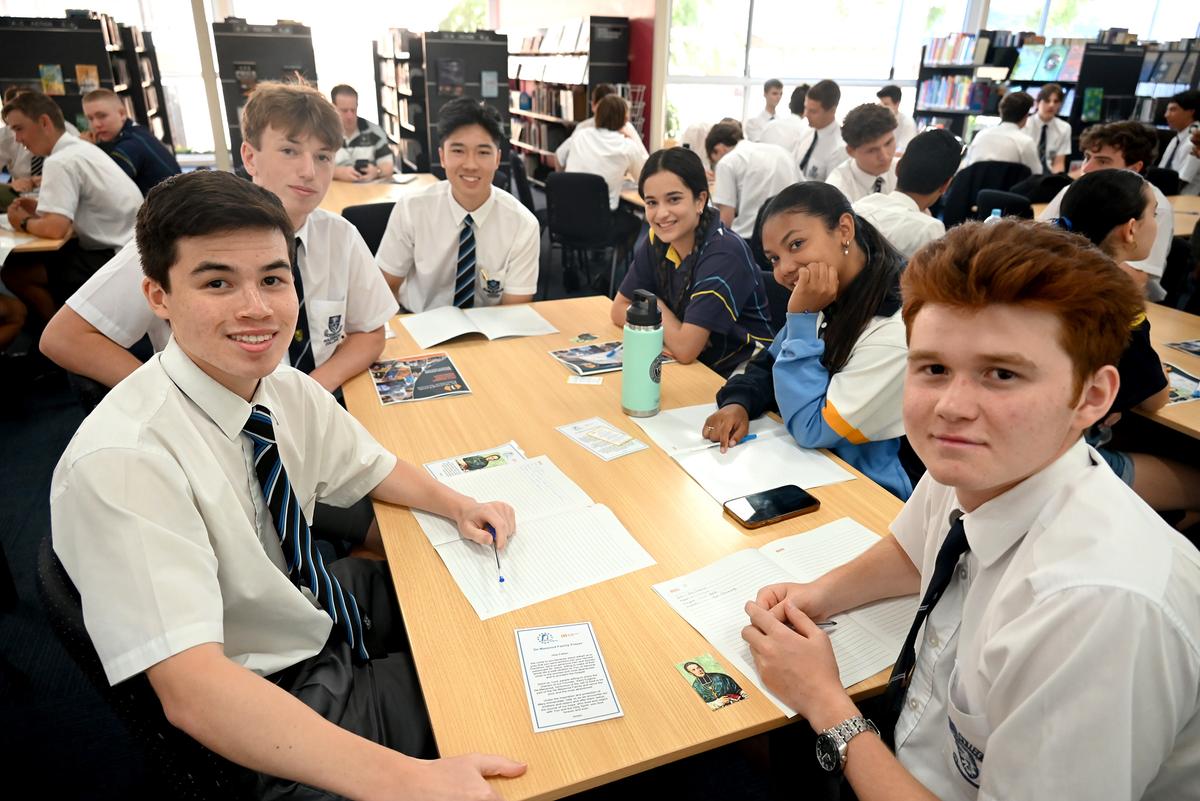From the Deputy Principal of Students

Oblate Conference
Last week Mazenod College hosted the 2023 De Mazenod Family Education Network Student Leadership Conference. I would firstly like to extend a further thank you to those families who hosted the incoming student billets. Without this support, events like this could not happen and from them, often, enduring friendships emerge.
The conference saw student leaders from Mazenod College WA, Mazenod College Victoria, Iona College and St Eugene's College converge on our campus for a three day program of leadership development. Students shared overviews of their schools to provide snapshots of similarities and differences in leadership structures, initiatives and points of distinction.
One standout initiative was from St Eugene College where the school created a Minecraft version of the school for virtual tours and orientation activities . Mazenod College WA also shared our own 360 degree virtual tour of the school and residential facilities, though the scale of the effort in the Minecraft conversion was breathtaking.
The students benefitted from keynote presentations from Fr Twigg OMI and Fr Dyer OMI as well as Provincial Fr Fini OMI. These presentations provided the history and Charism bedrock for later activities designed to foster leadership skills and activities for the portfolios of leadership across all schools.
Managing Screen Time
In this edition we look at the ongoing ICT consideration of screen time. The College would direct families to this edition of Mazenod School TV on the issue:
Managing Screen Time | Mazenod College - Lesmurdie (schooltv.me)
It notes many parents have reported excessive screen time as the number one health concern affecting kids, especially now in the hyperconnected world we live in. The World Health Organisation (WHO) recommends that there should be no screen time at all for children under two, less than an hour a day for children aged from two to five, and less than two hours for five to 17 year olds. However, these guidelines have been disputed by experts and often ignored by families. Parents must play an important role in modelling a positive approach to using screens, and assisting children to navigate the content they access.
The following information comes from the eSafety Commissioner:
Screen time | How much is too much? | eSafety Commissioner
As always, if you need further support from the College, please contact your respective Head of Year or our College Psychologists, James Rogerson (10 - 12) and Pia Kagi (7 - 9).
How Much is Too Much?
There is no magic figure. The right amount of screen time can depend on a range of factors like your child’s age and maturity, the kind of content they are consuming, their learning needs and your family routine. It can be easy to focus only on the clock, but the quality and nature of what they are doing online, and your involvement, are just as important.
Consider your child’s screen use in the context of their overall health and wellbeing. For example, is online time getting in the way of their sleep and exercise? Is it impacting on their face-to-face connections with family and friends? The answers to these questions will guide you and help strike the right balance of online and offline activities for your child.
Signs To Watch For
Signs that your child’s online activity may be having a negative impact on them or on your family include:
- less interest in social activities like meeting friends or playing sport
- not doing so well at school
- tiredness, sleep disturbance, headaches, eye strain
- changes in eating patterns
- reduced personal hygiene
- obsession with particular websites or games
- extreme anger when being asked to take a break from online activity
- appearing anxious or irritable when away from the computer
- becoming withdrawn from friends and family
What To Do If You Are Concerned
Ask questions and listen.
- Some of the behavioural changes described above are a normal part of growing up but, if you are concerned your child is struggling, try to find out why — there may be underlying issues such as cyberbullying, friendship difficulties or mental health issues.
- As part of your conversation, ask your child about how much time they spend online and explain why it is worrying and what they could be missing out on.
- Try not to show that you disapprove or they might shut down communication altogether.
- Talking to your child’s school may also reveal academic or social issues, and the school may also be able to provide support.
Explore underlying issues and seek help if necessary.
- You can read advice for parents about issues like cyberbullying, gaming, and grooming and unwanted contact.
- If necessary, you can get help for your child through a counselling or online support service.
Help Your Child Manage Their Online Time
Stay engaged and encourage balance.
- Keep an eye on the games, apps and devices your child uses. Chat with your child regularly and help them stay aware of how much time they are spending on different online and offline activities.
- Include positive things outside the online world in your conversations, such as what they love in life, careers they are interested in and new hobbies.
- Join in. Play games together as a family, or explore some joint online projects. Rather than being just a solitary activity, online time can then become another way of strengthening connections as well as building social skills.
- Where possible, avoid limiting online time as a punishment as this approach may inflate its importance to children.
Create a plan.
- Involve your child in creating a family plan for leisure and entertainment time that balances time spent sitting in front of screens — including time online and watching TV — and a variety of offline activities.
- Work out the plan together. Young people are more likely to respond to rules they have contributed to and see as being fair and consistent.
- As well as agreed age-based time limits, the plan could include rules about which websites can be visited and online games can be played. It could also include control of access to the internet or devices, perhaps with daily passwords revealed once family time, homework and chores are complete.
- A minor reduction each day or a ‘15-minutes to switch-off’ warning can help the transition to a more balanced use of time.
Reducing your own screen time also sets a positive example.
- You could also consider formalising your plan into a signed written agreement — a family online safety contract. Our advice in online safety basics has some tips on this.
- There should be clear consequences for not sticking to the agreement and it is important to follow through with these.
Use the available technology.
- Parental controls are software tools that allow you to monitor and limit what your child sees and does online. But be honest and open with your children about why and how you want to use these technologies.
- There are also apps and software to measure online time as well as set time limits on device use or internet access.
- Find out more information in parental controls.
Set boundaries for digital device use in your home.
Device-free zones and times can help you manage screen time.
For example, your family plan could include rules like this:
- no devices in the bedroom for younger children
- all screens off in bedrooms after a certain time for older children
- all screens off at least one hour before planned bedtime
- all family members switch off at dinner time
- devices charged overnight in a place your child cannot access
Michael Anderson
Deputy Principal of Students





